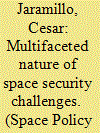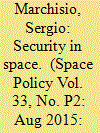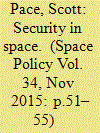| Srl | Item |
| 1 |
ID:
142595


|
|
|
| 2 |
ID:
142593


|
|
|
|
|
| Summary/Abstract |
The challenges facing the space domain are multifaceted and there need not be an expectation that they all be covered by a single initiative. Accordingly, no single space policy proposal will effectively address all challenges to the sustainability of outer space—from environmental to commercial to military. Should one of the existing proposals be adopted, it can make a concrete contribution to space governance, in particular if its adoption is not taken as an end goal that jeopardizes the pursuit of further complementary initiatives.
|
|
|
|
|
|
|
|
|
|
|
|
|
|
|
|
| 3 |
ID:
142594


|
|
|
|
|
| Summary/Abstract |
When discussing international texts and measures for improving security in space, one has to use precise terminology in order for any negotiating party to be clear with definitions. In the context of space security, several texts are being prepared to deal with this issue with different perspectives. Beyond the sole diplomatic aspect of these different proposals, it is important to make sure that they can be efficient in practice. In this respect, the Eu initiated project of an international code of conduct may prove to be a first important so called “transparency and confidence building measure” in space.
|
|
|
|
|
|
|
|
|
|
|
|
|
|
|
|
| 4 |
ID:
142591


|
|
|
|
|
| Summary/Abstract |
The United States has been engaged in multiple activities to enhance international stability and ensure the sustainability of space activities. This includes multilateral activities within the United Nations such ash the “Group of Government Experts” to study transparency and confidence building measures (TCBMs) for outer space activities. The European Union has been leading talks on a possible international space code of conduct and the United States is supportive of the process. However, European efforts have not been successful in securing support from space powers such as India and Brazil, much less China and Russia. Codes and TCBMs cannot be a substitute for the capabilities necessary to deter potential adversaries and meet U.S. alliance commitments. In fact, the viability of any such codes may rely on the development of deterrence-related capabilities, for example space situational awareness to attribute hostile acts in space. The United States and its allies should take measures to improve the resilience of space systems across the spectrum of conflict. Improving resilience can consist of both “material” and “non-material” solutions. The former include measures such as hardening space and ground systems against physical and cyber attacks. The latter can include development of alternative means of mission performance, such as the use of allied or commercial systems.
|
|
|
|
|
|
|
|
|
|
|
|
|
|
|
|
| 5 |
ID:
142592


|
|
|
|
|
| Summary/Abstract |
Significant initiatives on space traffic management have been recently taken, essentially by developing principles of outer space transparency and confidence building measures (TCBM) beneficial to a safer conduct of space activities. The need for improved practices in space traffic management is a consequence of the increasing number of space-faring nations allowing for more types of missions, growing number of space debris, new private entrants, and rising space content in running critical national infrastructures, to name a few. These expanding space activities underscore the society's dependency on space systems and its vulnerability, calling for an improved long-term sustainability of outer space activities. But the lack of information on the nature of some space payloads and their associated missions introduce a persistent flaw in succeeding to achieve a long thought stable and safer space environment. Indeed this noticeable weakness in the mentioned initiatives is not taken into account at this stage. To overcome this difficulty, a space situational awareness system (SSAS) based on a multinational organization, or under the purview of a UN steered agency, is proposed. It could be implemented promptly, provided there is a shared political will and a recognized urgent need to do so by major space-faring nations gauging their long-term interest while there is still time. The space deterrence postures by dominant space powers that have been identified during the past ten years, or so, argues in favour of broadening as soon as possible the scope of the current TCBM.
|
|
|
|
|
|
|
|
|
|
|
|
|
|
|
|